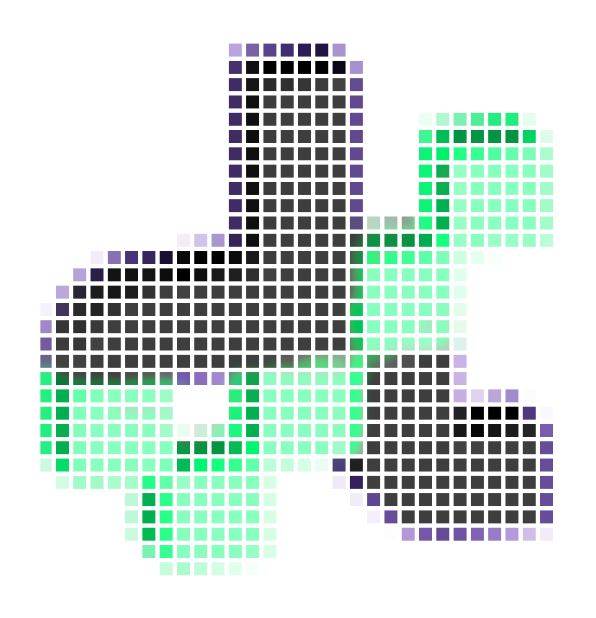DFICPRegistration component#
Inputs:
|
Insert a toggle. If set to true, it will use the generalized ICP algorithm. If false, it will use the standard ICP algorithm. |
|
The source point cloud. |
|
The target cloud. |
|
Maximum relative correspondence distance. 0.01 means 1% of the bounding box diagonal. |
|
Maximum number of ICP iterations to use in the p2p transformation estimation. |
|
(NB: only valid for ICP generalized) If true it deforms the cloud to match. The transformation estimation method to use. By default, it uses a point to point transformation estimation. If true it will scale and deform the cloud. |
|
(NB: only valid for ICP generalized) Use point-to-plane ICP instead of point-to-point. This replaces the p2p with the point-to-plane transformation estimation. |
Outputs:
o_x_form |
The computed transformation. |
Code:
#! python3
import Rhino
from ghpythonlib.componentbase import executingcomponent as component
from Grasshopper.Kernel import GH_RuntimeMessageLevel as RML
from diffCheck import diffcheck_bindings
from diffCheck import df_cvt_bindings
class DFICPRegistration(component):
def RunScript(self,
i_use_generalized_icp: bool,
i_cloud_source: Rhino.Geometry.PointCloud,
i_cloud_target: Rhino.Geometry.PointCloud,
i_max_corrspondence_dist: float,
i_max_iteration: int,
is_t_estimate_pt2pt: bool,
i_use_point_to_plane: bool) -> Rhino.Geometry.Transform:
if i_cloud_source is None or i_cloud_target is None:
ghenv.Component.AddRuntimeMessage(RML.Warning, "Please provide both objects of type point clouds to align") # noqa: F821
return None
if not i_cloud_source.ContainsNormals or not i_cloud_target.ContainsNormals:
ghenv.Component.AddRuntimeMessage(RML.Error, "Please compute cloud's normals with a component before") # noqa: F821
# set default values
if i_use_generalized_icp is None:
i_use_generalized_icp = True
if i_max_corrspondence_dist is None:
i_max_corrspondence_dist = 5
if i_max_iteration is None:
i_max_iteration = 50
# conversion
df_cloud_source = df_cvt_bindings.cvt_rhcloud_2_dfcloud(i_cloud_source)
df_cloud_target = df_cvt_bindings.cvt_rhcloud_2_dfcloud(i_cloud_target)
# fast registration
# these are the only hardcoded values since it will get the best result
RELATIVE_FITNESS = 1e-6
RELATIVE_RMSE = 1e-6
df_xform = None
if i_use_generalized_icp:
df_xform = diffcheck_bindings.dfb_registrations.DFRefinedRegistration.O3DGeneralizedICP(
source=df_cloud_source,
target=df_cloud_target,
max_correspondence_distance=i_max_corrspondence_dist,
max_iteration=i_max_iteration,
relative_fitness=RELATIVE_FITNESS,
relative_rmse=RELATIVE_RMSE
)
else:
df_xform = diffcheck_bindings.dfb_registrations.DFRefinedRegistration.O3DICP(
source=df_cloud_source,
target=df_cloud_target,
max_correspondence_distance=i_max_corrspondence_dist,
is_t_estimate_pt2pt=is_t_estimate_pt2pt,
relative_fitness=RELATIVE_FITNESS,
relative_rmse=RELATIVE_RMSE,
max_iteration=i_max_iteration,
use_point_to_plane=i_use_point_to_plane
)
print("-------------------")
print("Estimated transformation matrix:")
print(df_xform.transformation_matrix)
print("-------------------")
# cvt df xform to rhino xform
df_xform_matrix = df_xform.transformation_matrix
rh_form = Rhino.Geometry.Transform()
for i in range(4):
for j in range(4):
rh_form[i, j] = df_xform_matrix[i, j]
if rh_form == Rhino.Geometry.Transform.Identity:
ghenv.Component.AddRuntimeMessage(RML.Warning, "The transformation matrix is identity, no transformation is applied") # noqa: F821
return None
o_x_form = rh_form
return o_x_form
